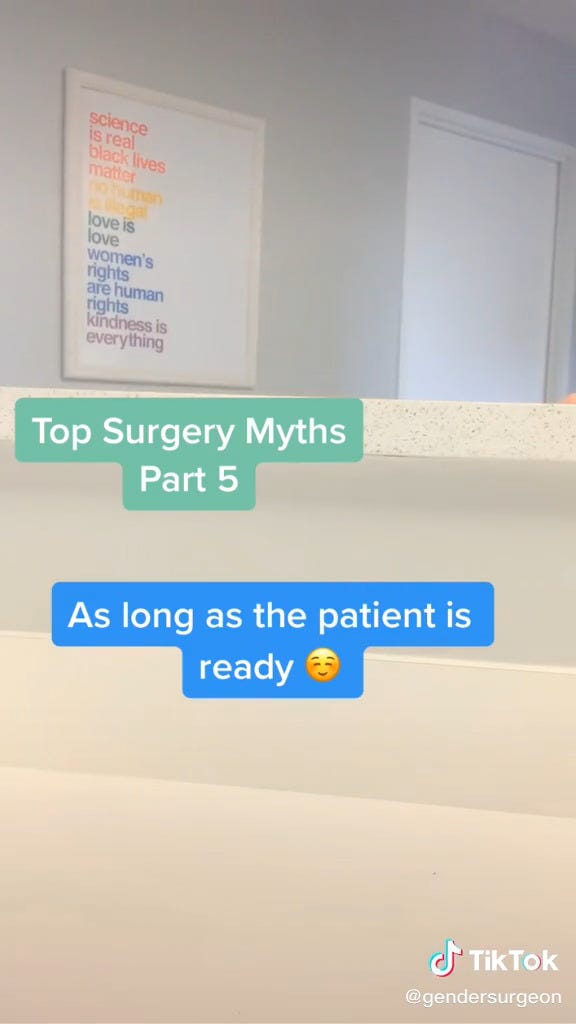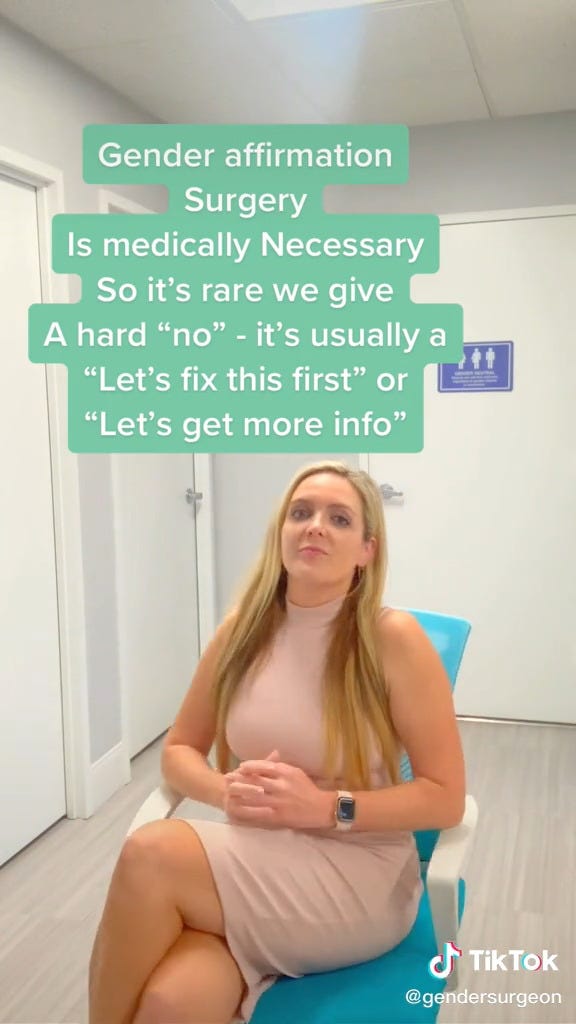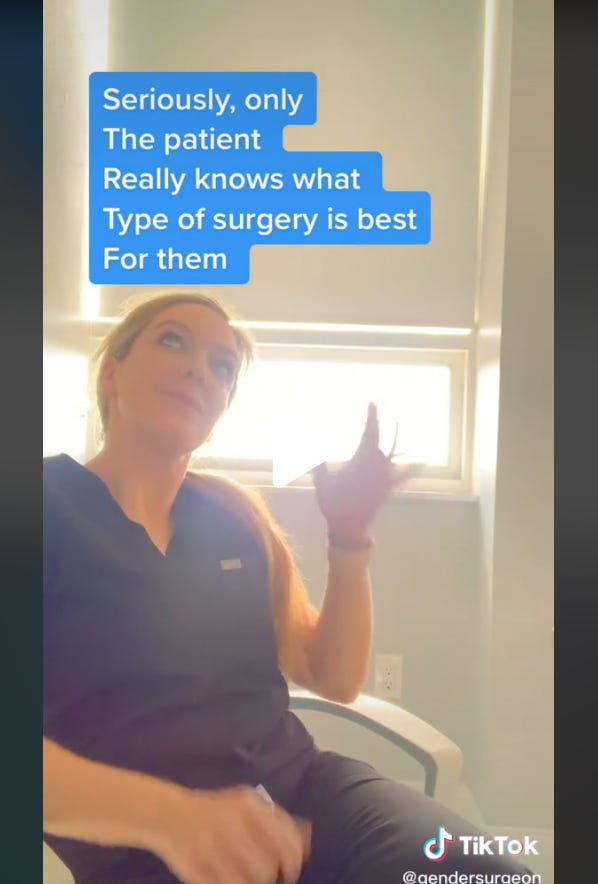The monstrous Dr. Gallagher
An Irish doctor is using TikTok to Advertise Double Mastectomies to Minors. "I have yeeted 100s of unwanted teets”"
(My thanks to Sasha White for permission to repost this from her Substack)

Several months ago, the New York Times generated a lot of buzz when they ran a piece about teen girls getting “top surgery,” featuring a picture of the woman who has come to be called the TikTok Surgeon, Dr. Sidhbh Gallagher. Dr. Gallagher is a Miami-based surgeon who openly admits to performing top surgery on minors, and advertises her services on the short video app TikTok. “Top surgery” is a euphemism for a double mastectomy, an operation usually reserved for women with breast cancer, but now being performed on the breasts of healthy girls as young as thirteen, because they no longer wish to be girls. The number of teens seeking medical transition is up 4000% in the UK, and in the US, an explosion of gender clinics across the country indicates the trend is here as well. Of all trans surgeries, mastectomies are the most common, and while exact numbers are not known, this surgery was performed on at least hundreds of minors in the U.S. in 2021. Earlier this year, a complaint about Gallagher was filed with the Federal Trade Commission for allegedly engaging in deceptive marketing to minors. Specifically, she is accused of claiming that double mastectomies on healthy breasts are “proven safe, effective, and medically necessary.” It isn’t hard to understand why this accusation was made once you take a look at the surgeon’s social media presence.
An elder millennial, Dr. Gallagher is a bubbly blonde woman who uses pop songs and Gen Z slang to peddle her fleshcraft to teens. In one short video she tells future clients to expect little pain after she “yeets the teets.” Yeet is Gen Z slang for violently throwing an object that you deem worthless, and the word happens to be one of Gallagher’s favorite terms for removing the breasts of minors. The surgeon has become known for her social media posts about performing “top surgery,” among a host of other cosmetic and transgender surgeries she offers. Not only does she boast of “yeeting the teets,” she playfully calls top surgery “teetus deletus.” Dr. Gallagher has openly admitted to removing the breasts of girls as young as fourteen, and has been accused of doing the surgery on even younger patients. On her Instagram, she posts images of her patients topless, their thick scars dark pink across their chests as they pose with the surgeon or with their parents. Gallagher told the New York Times that most of her patients find her through TikTok.
Plastic surgery should not be considered a morally defensible solution for anxious teens struggling with body image issues. Bella Hadid, a famous supermodel, recently admitted that she got a nose job at the age of fourteen. Hadid, who is half Palestinian on her father’s side, told Vogue Magazine that she wished she had “kept the nose of [her] ancestors.” “I think I would have grown into it,” she went on to say, expressing regret over the irreversible procedure. This confession was met with widespread condemnation toward her mother, a former model herself, for allowing Bella to get the surgery. Why do we as a society see that a nose job is a bad decision for an insecure fourteen year old, but we are considered bigots for questioning the morality of cutting off the breasts of girls that same age? As Abigail Shrier points out in her book Irreversible Damage, cosmetic surgery is not supposed to destroy the function of a body part. Top surgery, however, goes beyond just changing your appearance, and permanently destroys the function of the body part being removed. Women who undergo this surgery can never breastfeed. As Gallagher assures viewers in another of her TikTok videos, breasts do not grow back.
A national debate rages hotly between the faction that says pumping healthy kids full of hormones and chemical castration drugs and cutting off their body parts is abusive, and the horde that insists that the real abuse is denying children these “treatments.” Proponents of transing kids claim that the boom in underage transition is due to increasing social acceptance. If that is the case, why is there not a comparable rate of adult women coming out and saying that they too now wish to transition to male? The massive explosion is specific to young people in their teens and twenties.
The business of gender transition is a highly lucrative one. The cost for a single person to transition can rack up to $150,000. The process of medical transition is lifelong, since the patient continues to take cross sex hormones forever to maintain their effects (although some of the effects are permanent). Children are set on a path to permanent sterilization when they are medically transitioned at a young age. The earlier you put kids on this track, the more money in it for the transition industry, which in 2020 was worth a projected 304 million dollars, and is forecasted to grow over the coming years.
With around 270k followers on TikTok and 7.4 million likes across all her videos, Gallagher’s reach is as astonishing as her message. She claims that she is “yet to meet a patient who says [teet yeet] is worse than wisdom teeth.” According to findings by the University of Michigan, post-mastectomy pain can be as terrible as that experienced by limb amputation patients, with an estimated 40-60% of patients suffering from chronic pain. This information does not appear to be given in Gallager’s TikToks or on her site at the time of this writing. One detail her site does promote is the claim that it could be “much more detrimental” to an underage patient to wait until they reach eighteen.
While preparing this article, I contacted Dr. Gallagher’s office through her site’s contact form, writing that I was a thirteen year old “transboy” looking to get top surgery. I quickly received a reply letting me know the cost of the surgery ($9,500 - $11,500), inviting me to schedule a virtual consultation, and offering to set me up on their patient app. The email also said that they would need one letter from a mental health professional if I was under twenty-one.

Does the famous doctor turn young patients away? Dr. Gallagher did not respond to my request for an interview, but she tells us about her process on her social media. In one TikTok, she slides into view on her desk chair, smiling out at us, fingers crossed comfortably in her lap, wearing a tight beige dress. Upbeat pop music is playing over the video. Dr. Gallagher points at the words “why you should never be nervous at your gender affirmation surgery appointment.” The doctor smiles, and then cutely scrunches her face at the words “gender affirmation surgery is medically necessary so it’s rare we give a hard ‘no.’”
Although Gallagher claims on social media and in her interview with the Times that there is very little, if any, regret associated with the procedure, at least one former patient has already come forward to voice her regret. Grace Lidinsky-Smith first heard of Dr. Gallagher from Grace’s own doctor. A young woman in her early twenties and suffering from depression and long standing identity issues, Grace began to identify as a transman and wanted to have her breasts removed. After just one visit to her doctor, Grace was diagnosed with dysphoria and given the greenlight to start medical transition. Only four months after starting testosterone, Grace visited Dr. Gallagher, who removed her breasts. “I assumed that my growing dysphoria would continue to consume me unless I transitioned,” Grace wrote to me over email when I reached out to her for comment.
At first, Grace tells me, the surgery “provided a sense of control over my body and how people perceived me that was satisfying,” but that feeling soon gave way to horror and pain. The emotional discomfort she felt after her mastectomy was much sharper and more intense than the dysphoria that lead her to seek the surgery in the first place. “It was awful,” she tells me. “I wasn't very happy with the aesthetic results either. One of the nipple grafts healed in a strange way and the scars were somewhat crooked.” Grace is now an outspoken detransitioner who writes about her experiences and appeared on a 60 Minutes segment about detransition and regret. In the segment, Grace describes a powerful sense that something from her body was missing: “almost a ghost limb feeling,” she says.
In other TikTok videos, Gallagher says patients can choose to not have their nipples reattached if that feels more affirming, assures us that she also performs “non-binary” surgeries if a patient feels neither male nor female, and informs us that “regret is very rare.” The forty thousand members of the Reddit detransition board (a forum for people to discuss their pain and regret over transitioning) might beg to differ.
But what about the suicide risk, trans idealogues and their sycophants will scream in response to any challenge or critique. Groups like the ACLU pump out the narrative that any delay in “trans health care” is literally killing people, citing a commonly used statistic that says 41% of trans individuals have attempted suicide. Not only has this shockingly high statistic been called into question on its face, the narrative around it has been deeply irresponsible at best, and opportunistic and harmful at worst. Even more troubling, there is growing evidence that gender transition does not help improve mental health, and that post surgery individuals need more mental health treatment and become more suicidal. I asked Grace if the narrative around suicide and trans youth played into her decision to transition. The suicide narrative, she said, made her think “that the only way forward was transition.”
It is unfathomably risky to report that children who are not allowed to get top surgery will kill themselves, not only because of the horror of what the surgery is, but also because of the risk of causing suicidality in impressionable young people. Suicide, like gender dysphoria, is a social contagion. Guidelines for how to talk about suicide in the media exist because glamorizing suicide or making it out to be inevitable can lead to more people attempting it. The suicide narrative is a way to browbeat onlookers into submission. Parents are being told they must choose between a dead child and a trans child. Thousands of insecure teenage girls who want to self-harm, parents terrified of dead kids, and a culture that celebrates going full Frankenstein to try to reshape a girl into a boy: all this is the perfect storm for the profiteering of plastic surgeons.
Gallagher (AKA Dr. Teetus Deletus) markets this surgery to teens on their app, with their slang and their pop songs. In a TikTok from February 2022, she smiles warmly into the camera, bubbly music playing in the background. Text appears on the screen: “only the patient really knows what type of surgery is best for them.” Are we talking about a serious surgery being done on minors, or about something that should just be given out like candy to any kid who wants one?
Link to the quote in subheader: “I have yeeted 100s of unwanted teets”








Look at her eyes, she’s a psychopath. And the photos of her in her clingy dresses revelling in her womanhood whilst removing young women’s womanhood. Psychopath.
You know, I’ve been thinking about this. Part of the reason for such flagrant disregard of women’s breasts, and why they’re so easily dismissed, even removed -- is the utter lack of respect for their complexity and function. They are irreplaceable. Complex. Milk producing. Miracles of function and beauty. Yet for decades they’ve been called ‘boobs’ and ‘tits’. They are breasts. I refuse to use the word 'boobs' or 'tits', and notice that even the most dedicated feminists use these descriptors, not realizing the unconscious damage the words contain.
For decades, plastic surgeons have put harmful implants into them to please the male gaze. Everywhere we look, breasts have been pornographically reduced to playthings. And women have fallen for the societal degradation of their breasts, and have joined in that degradation -- constantly seeking cosmetic breast surgeries.
Breasts are not allowed to be on ‘public display’ if they are fulfilling their prime purpose — feeding a baby. God forbid. No wonder young girls have little regard for their breasts, if not downright fear of them and the attention they attract. And now we have TRA’s jiggling and fondling their own hormonally induced ‘moobs’ -- this travesty against nature will only further contribute to young girls’ hatred of their own bodies.